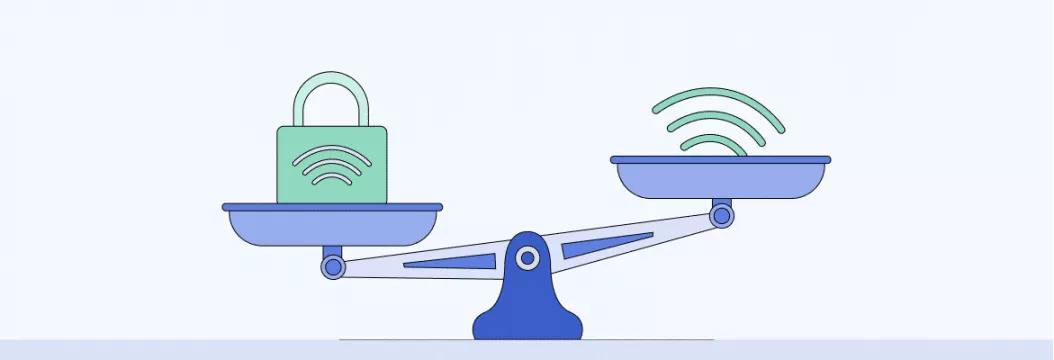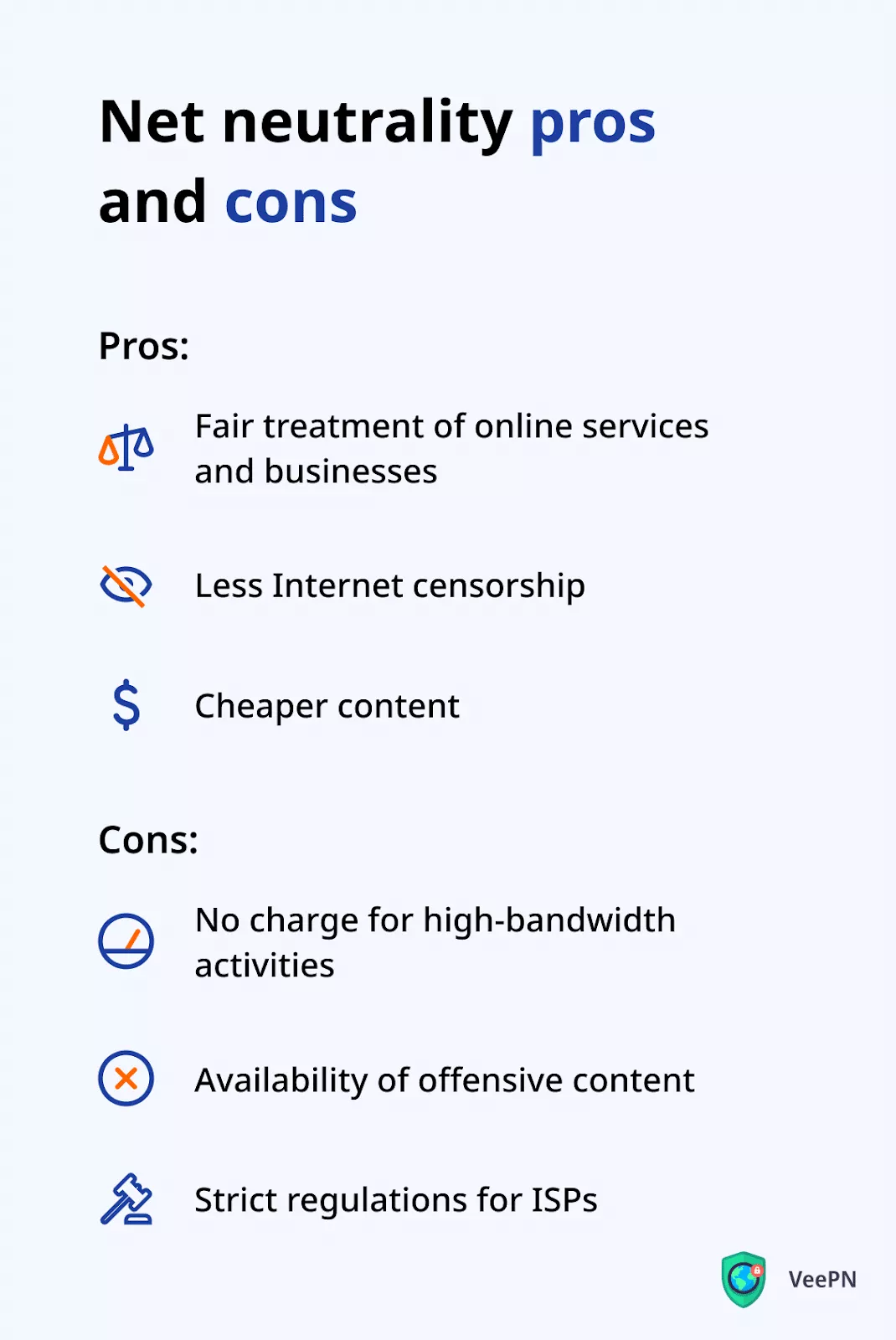Net Neutrality Pros and Cons Explained

Net neutrality was introduced to make all Internet traffic treated equally. These laws regulate how Internet service providers (ISPs) deliver online services and other content to users. However, after many attempts to establish a clear set of net neutrality laws, people are still debating about those regulations’ feasibility and effectiveness.
So, will net neutrality make the Internet a better place? And what does it have to do with your online privacy and freedom? Read along to learn all you should know about net neutrality pros and cons.
What is net neutrality?
Net neutrality is a concept stating that the Internet should be free, equal, and available to everybody. This principle also suggests that ISPs should have less impact on users’ access to the Internet and shouldn’t interfere with their online activities.
Many support the idea of net neutrality because ISPs often slow down users’ Internet connection for their benefit, treat web services unequally, and even block particular websites for no fair reason. On the other hand, the main argument against net neutrality is that there is no need for new rules regulating online freedom. Some believe that innovations in Internet fair play are possible without issuing new laws.
But anyway, the discussions around net neutrality and the need to implement new rules don’t stop. Let’s dive deeper into the net neutrality dispute to understand why it still seems controversial.
A brief history of net neutrality rules
The net neutrality concept was first introduced back in 2003, a year after privacy advocates criticized Comcast for collecting and storing customers’ data without their permission. Since then, the Federal Communications Commission (FCC) has made several attempts to impose new regulations regarding Internet equality and freedom.
- In 2005, FCC fined ISPs for interfering with the competition of online services
- In 2010, FCC released the Open Internet Order – a fairly clear set of net neutrality rules
- In 2015, FCC renewed the Open Internet Order that restricted ISPs from speeding up or slowing down the Internet traffic
- In 2017, FCC canceled many net neutrality rules, allowing ISPs to collect and sell customers’ data.
- In 2021, President Biden ordered the restoration of net neutrality rules. However, there are still certain bureaucratic bottlenecks to overcome, so the future of net neutrality remains uncertain.
Now that you know how many ups and downs net neutrality experienced over the previous two decades, let’s discover why this idea is still relevant and whether it really impacts Internet users.
The impact of net neutrality
Since net neutrality hasn’t been clearly established so far, the implementation of new rules significantly impacts all the parties in the dispute. In particular, these are companies and corporations providing web services, Internet providers delivering those services to users, and the users themselves. So let’s explore whether net neutrality is good or bad for those parties.
- Common Internet users. For customers, net neutrality would likely have a positive effect. With clear and transparent regulations for ISPs, online content will become more accessible, and the level of censorship will decrease. Internet providers won’t be able to block websites and slow down the connection speed to earn more money.
- ISPs. This group would suffer from net neutrality laws the most. With such regulations, the impact of the government on Internet providers will be much greater. Besides, ISPs won’t be able to make a profit by offering “better deals” after artificially reducing the connection speed for customers, as well as collecting their data and selling it to ad agencies.
- Web services and corporations. ISPs are not the only ones who may lose some income due to net neutrality. New laws may also lessen the power of corporations like Google, Meta, Amazon, and Apple that have a tight grip on the web. These companies control most of the Internet traffic, including ad businesses, app marketplaces, cloud storages, and other online infrastructure. Net neutrality will help smaller companies and web services avoid blocks and throttling, so they can compete with tech giants.
Net neutrality pros and cons
Still wondering whether net neutrality is good or bad for you? Let’s resolve this confusion once and for all. Here are the most significant benefits and drawbacks of net neutrality.

The advantages of net neutrality
Here are the most compelling benefits of net neutrality to consider.
- Fair treatment of online services and businesses
As mentioned above, ISPs often block certain online content. And most often, this content is provided by smaller start-ups and businesses that cannot pay big money to make their services more available. At the same time, it’s unlikely that an Internet provider will block the content of large corporations. Net neutrality can make this competition more fair, as all online services will be treated equally.
- Less Internet censorship
At the moment, the level of Internet censorship is higher than ever. According to the Freedom House, citizens of many countries don’t have free access to online content. Moreover, even in democratic countries, Internet censorship occurs quite frequently. However, if ISPs have less impact on users’ access to online content, the level of censorship will drop dramatically. That said, net neutrality allows for more freedom of speech and expression across the web.
- Cheaper content
Online services won’t have to pay ISPs to increase the quality and availability of their content. As a result, they won’t have to cover those costs at customers’ expense. So thanks to net neutrality, various Internet services will likely become cheaper for end users.
The disadvantages of net neutrality
Now, what are the arguments against net neutrality? Let’s see what the critics have to say.
- No charge for high-bandwidth activities.
With net neutrality, users will pay for an online service only. They won’t have to pay for the amount of bandwidth and consumed data. As a result, the price will be equal for all types of Internet activities. And users who don’t need any traffic-intensive activities (such as video streaming and online gaming) will have to cover the infrastructure behind such services.
- Availability of offensive content
While net neutrality reduces the level of Internet censorship, it also prevents ISPs from blocking illicit and potentially offensive content. So there’s a risk that some unwanted and dangerous websites and videos will become more available.
- Strict regulations for ISPs
Again, the establishment of net neutrality rules will cause much trouble to ISPs, as FCC and other government organizations will monitor their activities more strictly. This may also result in extra expenses required for regular reports, which will be particularly challenging for small Internet providers.
Now you’re aware of the benefits and drawbacks of net neutrality. However, the future of the potential changes in this regard is vague. It’s still unclear if the net neutrality rules will be realized soon (and whether they will work properly). So it’s worth taking some extra steps to protect yourself online.
Can you enhance your Internet freedom without net neutrality?
For now, we still often face situations when ISPs compromise users’ online activities and limit their freedom. Here are the most common challenges to overcome.
- Internet throttling. This technique allows Internet providers to intentionally slow down users’ connection speed and limit the amount of bandwidth they consume. Since an ISP can see what kind of activities you’re busy with (such as streaming media or playing games), they may limit your connection and device’s performance.
- Blocked content. ISPs often block users’ access to certain content, even when it’s not harmful, dangerous, or illicit. Most often, this is due to Internet censorship which is more or less common in different countries worldwide.
Luckily, you can avoid those limitations with the help of a virtual private network (VPN). This handy tool changes your IP address to conceal your online identity and encrypts your traffic while rerouting it through a remote server. As a result, no third parties, including ISPs, will be able to track your Internet activities, compromise your data, and interfere with your traffic. Note that your Internet provider will know you’re using a VPN. But that’s it. They cannot see the websites you visit, files you download, messages you send, videos you watch, and so on.
Need to protect your data and privacy? – Try VeePN!
Got tired of waiting until new laws will enhance your Internet privacy? Protect yourself now with VeePN today! This reputable VPN service will help you keep your data to yourself thanks to reliable AES-256 encryption and a bunch of powerful online security features. VeePN provides access to over 2,500 VPN servers across 89 locations in 60 countries. With its help, you can stop Internet throttling and browse the web safely without compromising your connection speed.
Try VeePN now with a 30-day money-back guarantee!
FAQs
Is net neutrality good or bad?
Net neutrality is beneficial for common users, as it decreases the level of Internet censorship and makes online content more accessible. Moreover, thanks to net neutrality, web services are treated equally. However, these rules are disadvantageous for Internet service providers, as the government enhances its control over their activities. In particular, due to net neutrality, ISPs cannot collect and sell users’ data, block access to specific content, and intentionally slow down customers’ connection speed. For more information, read this article.
Why is net neutrality important?
The role of net neutrality is to treat online services more equally and make them available to everyone at the same capacity and speed. As a result, it enhances users’ online freedom and prevents Internet service providers from privileging certain content and interfering with users’ privacy. For more details, read this article.
What are the disadvantages of net neutrality?
Many people remain skeptical about net neutrality due to the following reasons:
- It doesn’t charge traffic-intensive Internet activities
- It may increase the availability of illicit and offensive content
- It imposes strict regulations for Internet service providers
Read this article to learn more.
VeePN is freedom
Download VeePN Client for All Platforms
Enjoy a smooth VPN experience anywhere, anytime. No matter the device you have — phone or laptop, tablet or router — VeePN’s next-gen data protection and ultra-fast speeds will cover all of them.
Download for PC Download for Mac IOS and Android App
IOS and Android App
Want secure browsing while reading this?
See the difference for yourself - Try VeePN PRO for 3-days for $1, no risk, no pressure.
Start My $1 TrialThen VeePN PRO 1-year plan






